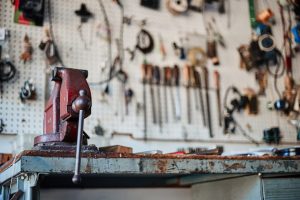
National 5 Practical Metalwork
The National 5 Practical Metalworking course provides opportunities for pupils to gain a range of theoretical and practical metalworking skills relating to tools, equipment, processes and materials. They also develop skills in reading and interpreting working drawings and related documents as well as an understanding of health and safety.
The course is practical, exploratory and experiential in nature. It engages pupils with technologies, allowing them to consider the impact that practical technologies have on our environment and society.
Through this, they develop skills, knowledge and understanding of:
-
metalworking techniques
-
measuring and marking out metal sections and sheet materials
-
safe working practices in workshop environments
-
practical creativity and problem-solving skills
-
sustainability issues in a practical metalworking context
Bench skills
Pupils develop skills, knowledge and understanding in the use of metalworking hand tools, bench-fitting work, routine sheet-metal work, measuring and marking out, involving complex features. Pupils develop their ability to read and use drawings and diagrams depicting both familiar and unfamiliar metalwork tasks.
Machine processes
Pupils develop skills, knowledge and understanding in the use of metalworking machines, equipment, related processes, materials, measuring and marking out, involving complex features.
Fabrication and thermal joining
Pupils develop skills, knowledge and understanding in fabrication, forming and joining of metalwork components with some complex features. Pupils develop skills in thermal joining techniques and in measuring and marking out.
The following projects are covered:
- Hand router
- Cold Chisel
- Bird house
- Plumb Bob
Progression
Pupils may also use this qualification to progress onto other practical technology subjects and further education training. Practical Metalworking is invaluable for students who wish to pursue a practical vocation or have an interest in developing practical skills that will be used in later life. It teaches skills and confidence in using tools, machinery and fabrication processes while learning how to work safely. Students learn how to work independently and also as team members during their time in the workshop environment.
Learning Resources:
1.0-PMW-Intro-Safety-in-Workshop
2.0-PMW-Theory-Metal-Properties
3.4-PMW-Unit-1-Bending-MetalAfter-Model-1
3.5-PMW-Unit-1-Tapping-Threading-After-Model-12
4.0-PMW-Unit-2-Machine-Processes-Pillar-Drill-1
4.1-PMW-Unit-2-Machine-Processes-Lathe
4.2-PMW-Unit-2-Machine-Processes-Milling-Machine
4.3-PMW-Unit-2-Machine-Processes-Laser-Plasma-Water-Jet
5.0-PMW-Unit-3-Thermal-Joining-Fabrication-Spot-Welding
5.1-PMW-Unit-3-Thermal-Joining-Fabrication-Arc-Welding
5.3-PMW-Unit-3-Finishing-Metals
Micrometer-and-vernier-calipers
Homework:
SQA course Specification
PracticalMetalworkingCourseSpecificationN5
Website links:
Good youtube links (word document filled with lots of subject specific links)

